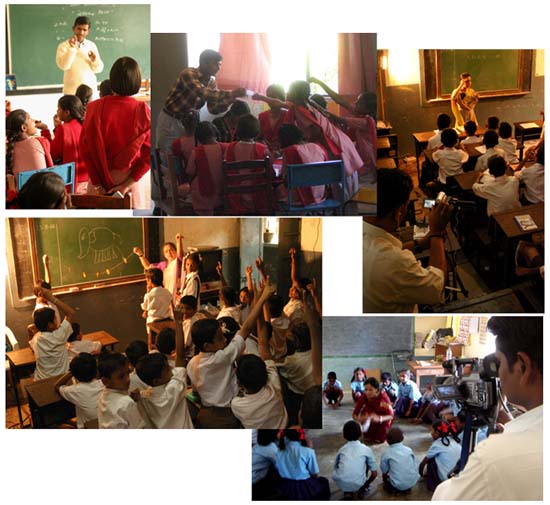A Network of Hubs and Spokes
DSH is not a physically centralized system. Instead, DSH is designed to work as a decentralized network of hubs and spokes. Each hub is a center of education excellence and the hubs themselves "talk" to each other. The spokes are typically the poor rural and urban slum schools that need help the most, schools that lack good teachers, good content, and other resources. Each hub works on content production (typically in a local language), content dissemination in its neighborhood, teacher training, monitoring, and evaluation, and interacting and sharing with other hubs.One of the most important roles played by a hub is to ensure that the content generated at the hub is appropriate for the target audience of the underprivileged children to be served by the hub. We cannot simply record lessons in middleclass schools and hope the resulting content can be meaningful for a rural audience. (English-medium vs. Hindi-medium, CBSE boad vs. UP board, for example.) At our Lucknow hub, we enlist the best teachers from a middleclass school, stage and record specially designed classes in front of an audience of children from the neighborhood slums, who share similar backgrounds as our other target audience. For a similar purpose, at our Pune hub, selected teachers from a middleclass school are sent to teach and get recorded in government schools in the neighborhood.
Yet another way for a hub to accomplish scalable content production and ensuring its relevance is to involve the spoke schools in the content production process. At our Bangalore hub, we identify the best teachers in the spoke schools served by the hub, organize them into a regular recording schedule, and the resulting content is shared with the other peer spoke schools. This approach not only ensures content relevance, but also motivates the spoke school teachers: the teachers being recorded strive to learn and use the best methodology to put on the best shows they can, and the peer teachers who receive the content are inspired to match their peers. Involving the spoke school teachers in this manner is perhaps an even truer manifestation of the philosophy behind the "People's Database."

To the first order of approximation, we at DSH see ourselves as "plumbers." We do not build schools from scratch. Instead, we work with existing schools, organizations, and teachers: they get to do what they have always wanted to do, but with the aid of a "digital pipe" that DSH helps them set up, they can now hopefully reach a larger population of under-served children more effectively.